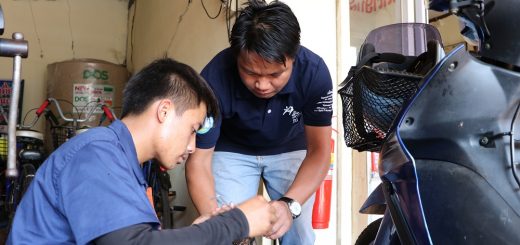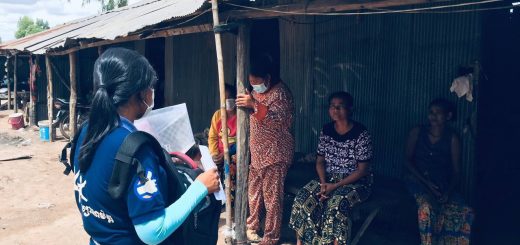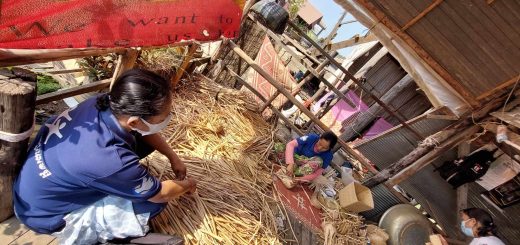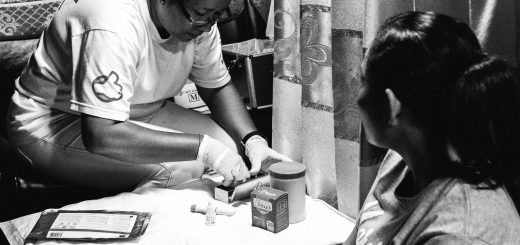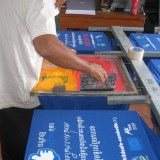D’s Story – from the streets of Vientiane to hope for a future…
One day Peuan Mit received an email about a young boy spending his days and nights in front of a local guesthouse. A volunteer staying there had talked to the boy who seemed to have no family or place to stay, and didn’t seem to be eating or sleeping much. He was about 16 years old, and the only aspect of his life which came out consistently from the various stories he told was that he came from the south of Laos.
Worried, the volunteer decided to raise the issue with one of his colleagues. She contacted a child protection organization, where the staff, in turn, contacted Peuan Mit.
The same day, the Peuan Mit team contacted the volunteer by phone to obtain more details about the location where the boy was regularly seen at, and a short description. This suggested that the boy had never been in contact with Peuan Mit before which meant he was new to the streets of Vientiane.
That night, the outreach team went out to meet him. They found him exactly where he was expected to be. Very skinny, with cropped hair, wearing a dirty t-shirt and boxer shorts, he was sitting with backpackers in front of the guesthouse, drinking beers.
A brief discussion with the tourists sitting there revealed that the boy had been living around the guesthouse for at least ten days. He seemed perfectly harmless so that the guesthouse staff did not feel the need to chase him away. Backpackers would occasionally buy him food and encourage him to eat. Others would offer him drinks and cigarettes, which he took. Every other person walking in or out of the guesthouse would shake hands with him, while others just ignored his attempts at making new friends.
The two outreach staff sat down with him in a quiet area as the night was falling on the Vientiane river front, and tried to find out who he was. His name was D. He repeated that he came from the South of the country, but the rest of his story was unclear. He explained that he was drunk. He also looked absolutely exhausted.
When asked if he would like to stay at the Peuan Mit home that night, he readily accepted. The team explained to him the rules, including no drinking or smoking, that he would have to be friendly and nice to the other children, and that he would have to respect the house parents and obey their directions. This didn’t seem to be a problem, especially when a place to sleep, a bath, some food, and clean clothes were so appealing.
By 8pm that night, D. was brought to the Peuan Mit home. It was already dark, but children were still out in the yard playing badminton and other games. They rushed to the gate when they heard the motorbikes, craning their necks to see who was coming and opening wide curious eyes. D. was quiet and waited patiently to go in. The children circled around him rapidly, asking a million questions, smiling at him, jumping up and down in excitement. A friendly crowd, but probably a bit overwhelming for D. who could barely stand up by then. He didn’t say anything but smiled, and nodded yes when asked again if he wanted to spend the night. So the house parents showed him where he could wash himself, fed him the evening meal, gave him clean clothes for the night, and showed him the boys’ bedroom.
The next day, he received a health check-up early in the morning which revealed he was slightly malnourished and that his brain had suffered some damage from a very extensive consumption of alcohol.
More in-depth discussion with social workers in the next few days revealed that he was not in fact from the South of Laos, but from a suburban village in Vientiane Capital, and that he had been arrested in the past for small thefts and drug use. His newly appointed case managers contacted his family and discovered that he was victim of physical and verbal abuse at home which is why he decided to leave and go explore the city by himself.
It took D. a while to decide whether he wanted to go back to his village, start school again, or start vocational training. The Peuan Mit team gave him the time he needed to settle down, improve his health, and create his “life plan” while staying in the transitional home at night, playing with other children and young people, and taking non-formal education during the day at the Peuan Mit center. After a while, he decided he wanted to stay with Peuan Mit, to study mechanics at the vocational training garage.
Today, D. is still staying at the Peuan Mit home, with 30 other vocational training students who have their own “dormitory” section of the transitional home, separated from the smaller children. His hair is slowly growing, he is putting on some weight, and he is becoming more confident every day with the other children and the Peuan Mit staff.



